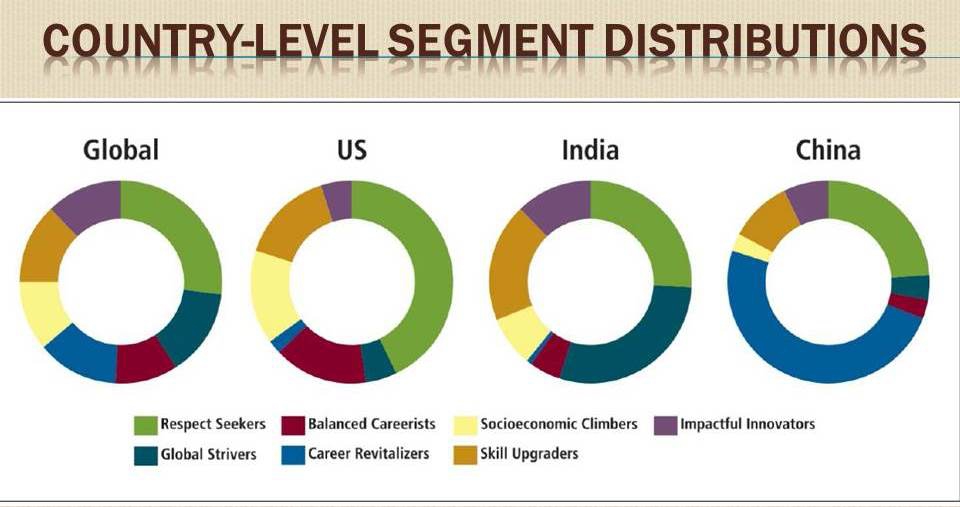A significant 29 per cent of Indian MBAs have global aspirations, while Chinese and Americans want to stay home.
Why do Indians pursue MBA? It’s not just financial improvement and career advancement, they have a motive and a predefined goal.
There is a segment of MBA pursuers, who are called ‘global strivers’ and they can be found in large numbers in developing countries, especially India. Globally, the share of these MBA pursuers is only 14 per cent, but in India, they make a whopping 29 per cent. In the US and China, on the other hand, the numbers are very marginal — five per cent and four per cent, respectively.
As the name suggests, these students aim to gain employment opportunities in other countries, which is why they are likely to opt for colleges that are recognised worldwide, stand tall in global rankings and also offer on-campus career recruiting.
This is not all. A large part of the Indian MBA pursuers also fall in the category of ‘respect seekers’. Globally, they are 27 per cent of the community and in India their share is at par — 26 per cent. These ‘respect seekers’ pursue a management degree merely to gain respect and recognition. Their intention is to heighten their standing in the society— among colleagues, peers and parents. They aspire to be seen as role models. Unlike the ‘global strivers’, this group doesn’t believe in the star rating of colleges, instead they are more interested in the alumni network. They rely on recommendations when opting for a college and are more worried about the experience that the colleges offer.
This segment of MBA students are found in large numbers in the US — around 43 per cent, and reasonably in China — 24 per cent.
‘Skill upgraders’ are the next big segment in India, with 19 per cent share, vis-à-vis 13 per cent global average. About half the ‘skill upgraders’ are from Asia (55 per cent) and about a quarter are from North America and Central America (23 per cent). Their only motive to pursue an MBA degree is to gain knowledge so they are eventually seen as experts in their respective fields. While opting for a college, they mostly look for quality education. In the US, their share is 14 per cent, while in China it is 10 per cent.
‘Career revitalizers’, the next segment, belongs to seasoned professionals who are driven by a desire to reinvent themselves. Their motive is simple — advancement in their career. They choose to pursue an MBA because of work-related issues. That is why, they look for part-time MBAs, but prefer institutes with high-quality instructors.
Interestingly, they form the most dominant segment in China, making up nearly half of the candidates — 49 per cent. However, in the US, their population size is only 2 per cent and for India it’s even smaller — only 1 per cent.
Very similar to the ‘skill upgraders’ are the ‘impactful innovators’ who seek a management degree to develop their skills. Their objective is not to bag a job but to give wings to their dreams — establish their entrepreneurial ventures. They form 12 per cent globally as well as in India. They are found in significantly large numbers in Africa and Indonesia.
 ‘Socio-economic climbers’ and ‘balanced careerists’ form the remaining 13 per cent among the MBA candidates in the country — eight per cent and five per cent, respectively.
‘Socio-economic climbers’ and ‘balanced careerists’ form the remaining 13 per cent among the MBA candidates in the country — eight per cent and five per cent, respectively.
‘Socio-economic climbers’ are very much like the ‘respect seekers’. Their objective is to improve their socio-economic status so that they can provide themselves and their children with a better future. In simple words, they feel an MBA degree will get them more money and better stability in their careers. This segment is found in large numbers in the growing ex-economies, such as Brazil, Mexico and Russia. They also prefer part-time courses and look for institutes that offer excellent academic reputation and high-quality faculty.
Similarly, ‘balanced careerists’ who are 10 per cent of MBA candidates, globally, are also motivated by financial improvement and career growth, but at the same time, they do not want to disrupt their normal life. This implies they look for convenience — proximity to home, availability of online classes, timing (preferably evening) and ease of acceptance — over other things, while selecting an MBA college. They are usually government or PSU officials. This segment is more likely to be found in North America and Europe. In the US, their share is 15 per cent, while in China it is only three per cent.
Though it’s a well-accepted fact, it’s worth mentioning that 53 per cent of Indian MBA pursuers are engineers — globally it is only 33 per cent. They are more likely to work for IT companies post degree — 39 per cent for India vis-à-vis 19 per cent, globally.
The global average age of MBA candidates is 31 years, whereas Indian candidates are younger with an average age of 29.
The social divide in India is also evident by the fact that 86 per cent of MBA students have parents with a post-secondary degree, whereas globally the figure is 68 per cent.
(As per a report published by GMAC – Graduate Management Admission Council)



